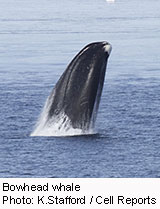- Could Your Grocery Store Meat Be Causing Recurring UTIs?
- Are You Making This Expensive Thermostat Error This Winter?
- Recognizing the Signs of Hypothyroidism
- 10 Strategies to Overcome Insomnia
- Could Artificial Sweeteners Be Aging the Brain Faster?
- Techniques for Soothing Your Nervous System
- Does the Water in Your House Smell Funny? Here’s Why
- Can a Daily Dose of Apple Cider Vinegar Actually Aid Weight Loss?
- 6 Health Beverages That Can Actually Spike Your Blood Sugar
- Treatment Options for Social Anxiety Disorder
200-Year-Old Whale May Give Clues to Human Longevity


A whale that lives more than 200 years with no signs of age-related disease may give scientists new insight on how people can live longer, healthier lives, a new study finds.
For the first time, British researchers have completed the genetic map (“genome”) of a large whale — the bowhead whale. In doing so, they spotted key differences between the genome of the bowhead whale and other mammals.
Changes in the bowhead’s genes tied to aging, cell division, cancer and DNA repair may all play a role in why the whales live so long, according to the study published Jan. 6 in Cell Reports.
“Our understanding of species’ differences in longevity is very poor, and thus our findings provide novel candidate genes for future studies,” study senior author Dr. Joao Pedro de Magalhaes, of the University of Liverpool, said in a journal news release.
“My view is that species evolved different ‘tricks’ to have a longer lifespan, and by discovering the ‘tricks’ used by the bowhead we may be able to apply those findings to humans in order to fight age-related diseases,” he added.
The researchers pointed out that large whales like the bowhead have more than 1,000 times more cells than people, and yet they appear to be resistant to cancer. This suggests that these whales may have a natural defense mechanism that suppresses cancer more effectively than other mammals, they said.
Looking ahead, the study authors hope to breed mice with certain bowhead whale genes to determine which are important for longevity and resistance to disease.
The whale genome may also help identify certain adaptations related to the large mammal’s size, such as a much lower metabolic rate.
More information
The U.S. National Institute on Aging has more about longevity and healthy aging.
Source: HealthDay
Copyright © 2026 HealthDay. All rights reserved.










